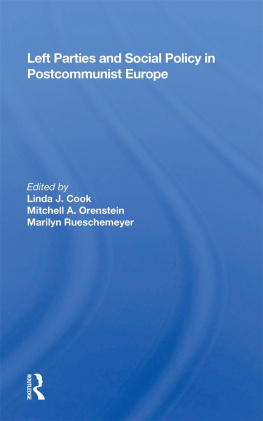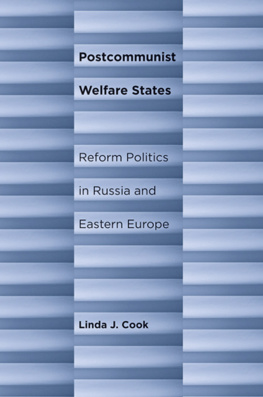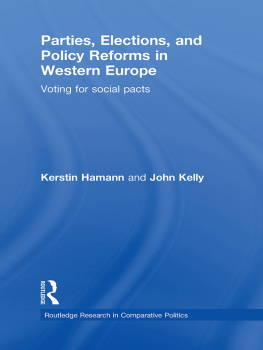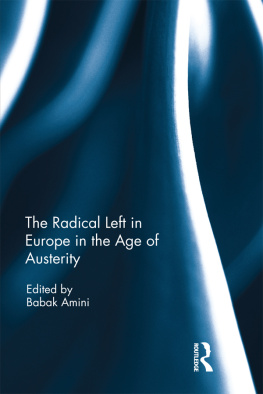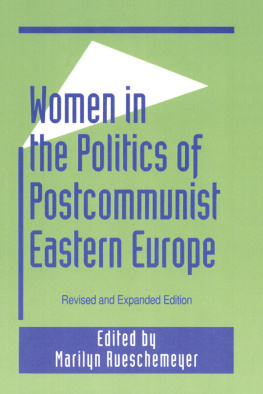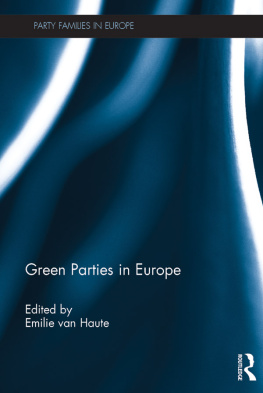First published 1999 by Westview Press
Published 2018 by Routledge
52 Vanderbilt Avenue, New York, NY 10017
2 Park Square, Milton Park, Abingdon, Oxon OX14 4RN
Routledge is an imprint of the Taylor & Francis Group, an informa business
Copyright 1999 by Taylor & Francis
All rights reserved. No part of this book may be reprinted or reproduced or utilised in any form or by any electronic, mechanical, or other means, now known or hereafter invented, including photocopying and recording, or in any information storage or retrieval system, without permission in writing from the publishers.
Notice:
Product or corporate names may be trademarks or registered trademarks, and are used only for identification and explanation without intent to infringe.
A CIP catalog record for this book is available from the Library of Congress.
ISBN 13: 978-0-367-00262-6 (hbk)
DIETRICH RUESCHEMEYER
If the collapse of European Communism in 1989-1990 came as a great surprise, it was nearly as much a surprise that four or five years later parties of the left made substantial electoral gains across Eastern Europe. True, some observers had considered social democracy all along as the best alternative to communism or, perhaps better, to authoritarian state socialism. They therefore expected moves toward social democratic solutions that would combine democracy with some continuation of strong social security provisions as the most plausible and likely option after the East European regimes failed.
However, especially in East-Central Europe, the collapse of these regimes released strong anticommunist and some anti-Russian reactions, as well as fostered hopes for a rapid capitalist approach to affluence. This reaction in the East was echoed and reinforced in the West, where the situation after the end of the Cold War was defined primarily as the failure of socialism in any form and as the triumph of neoliberalism. The first elections after 1989-1990 confirmed these responses.
Few observers anticipated that in the second wave of elections left parties would gain significantly in country after country. In Poland, where Solidarity fought its prolonged and finally successful fight against the communist regime, the Democratic Left Alliancea transformed communist, now social democratic partyincreased its share of the vote from 11.9 percent in 1991 to 20.4 percent in 1993, and led a left coalition to win an overwhelming majority of parliamentary seats against liberals and conservatives.
In Hungary, where the old regime itself had initiated liberalization, the Socialist Party, which also was created out of the old communist party, moved from just over 10 percent in 1990 to 33 percent of the vote in 1994 and, due to provisions guarding against party fragmentation, gained a majority of seats in parliament.
The Party of Democratic Socialism, another transformed communist party, nearly doubled its initial vote of 10 percent in eastern Germany, the former German Democratic Republic. Meanwhile, the Social Democratic Party gained steadily, increasing its vote from under 25 percent in 1990 to just over 30 percent in 1994.
The unreformed Communist Party in the Czech Republic retained only about one of every ten voters, but the newly founded Social Democratic Party rapidly gained ground against the dominance of liberal parties after it overcame initial difficulties by moving from 4.1 percent and 6.5 percent in 1990 and 1992 to 26.4 percent in 1996. By 1998, it became the country's strongest party, with 32.3 percent of the vote.
The essentially unreformed Communist Party of Russia became the strongest party in the Duma in 1995 with 22 percent of the vote. Although it had nearly doubled its share of the vote in 1993, it was unable to unseat Yeltsin as president, who, after the new constitution of 1993, could rule with vastly increased powers and whose actions were largely independent of parliament.
If nonsocialist governments were returned to power in Poland and Hungary after the elections in 1997-1998, the votes captured by parties of the left stabilized or even increased in all of the countries mentioned. These developments parallel each other in ways that are important to explore. At the same time, even this most cursory overview suggests that the label "left" covers a range of very different parties.
At least three distinctions spring to mind: the difference between former communist parties that are dominated by reforming and democratically oriented elites (as in Poland and Hungary) and those led by rather unreconstructed cadres of the earlier regime (as in the Czech Republic); the distinction between reformed communist parties that now adopt the name of democratic socialism and social democratic parties that have deep historical roots but face the task of reconstituting themselves after forty years of destruction and forced absorption by their communist rivals (for which the German and the Czech Social Democratic Parties are the main examples); and the distinction between social democratic parties of either kind and parties of a different character that are likely to support left of center policies (the peasant parties in Poland and Russia, the left liberals in Hungary, and possibly the Christian and Democratic Union [KDU-CSL] in the Czech Republic). These distinctions are sometimes fuzzy but they are not less important. We will revisit them throughout this book.
There are common elements in these different resurgences of the left, and at least for the East-Central European countries, they seem to add up to a common political meaning. We see here primarily responses to the unexpected hardships of the transition from the political economy of state socialism. These responses remain, as Mitchell Orenstein convincingly argues (Orenstein 1998), embedded in a party-transcending project of continued market-oriented reform.
Yet within this project, there is room tor lively political debate, and the social issues at stake are in the eyes of many voters more important than the presence or absence of links to the past regime. Especially if a party establishes a credible commitment to political and economic reform, its organizational and personal roots in the past are treated by many voters with benign neglect. It is this unexpected weakness of a "postcommunist anticommunism"which has a different and much more compelling meaning in the East than in the Westthat makes the success of the communist successor parties so surprising.


